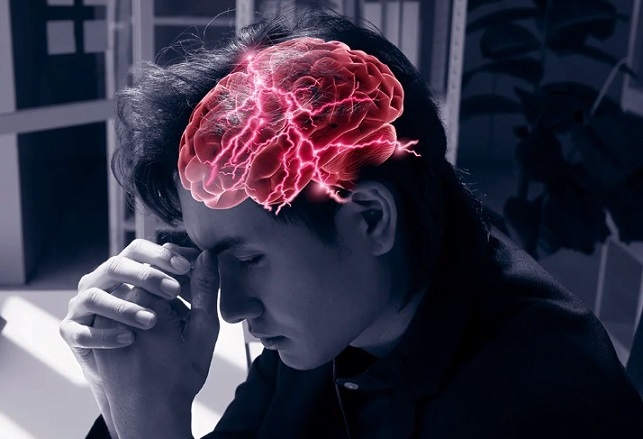Study Finds That COVID-19 Alters Brain Function by Disrupting Alternative Polyadenylation!
Nikhil Prasad Fact checked by:Thailand Medical News May 08, 2025 8 months, 4 weeks, 1 day, 6 hours, 3 minutes ago
Medical News: COVID Infection Disrupts Brain Cell Function Through RNA Processing Mechanism
A new study from scientists at Xiamen University in China has uncovered how COVID-19 can trigger long-term neurological and psychiatric problems by disrupting a key process in brain cells known as alternative polyadenylation (APA). Researchers from the Institute for Clinical Medical Research, the Xiamen Cell Therapy Research Center, and the Department of Pulmonary and Critical Care Medicine—all under the First Affiliated Hospital of Xiamen University,China—conducted this groundbreaking investigation.
 Study Finds That COVID-19 Alters Brain Function by Disrupting Alternative Polyadenylation!
Study Finds That COVID-19 Alters Brain Function by Disrupting Alternative Polyadenylation!
The team used cutting-edge single-cell analysis to examine changes in brain cells taken from deceased COVID-19 patients. Specifically, they focused on cells in the frontal cortex, a region of the brain responsible for decision-making and cognition. This
Medical News report explains how they found widespread and cell-specific alterations in APA, a process that determines the stability and function of messenger RNA (mRNA)—the blueprint that guides protein production in cells.
What Is Alternative Polyadenylation and Why It Matters
APA is a normal process in human genes that helps generate different versions of proteins from the same gene. It works by choosing where to cut and add a tail to the mRNA, which affects how long the mRNA survives and how much protein it produces. In the brain, this mechanism plays a critical role in memory, learning, and maintaining healthy neurons.
The study showed that COVID-19 infection alters the APA landscape in neurons—particularly glutamatergic and GABAergic neurons—causing them to use different polyadenylation sites than normal. This shift affects genes involved in essential brain functions like synaptic plasticity, neurotransmitter regulation, and cognitive performance.
Major Findings and Disrupted Genes
A total of 267 genes associated with neurological and psychiatric disorders such as Alzheimer’s, Parkinson’s, depression, and schizophrenia were found to be significantly disrupted in their APA patterns. These changes included either shortening or lengthening the 3’-UTR (untranslated region) of mRNAs, which in turn altered the interaction with microRNAs—small molecules that control gene expression.
For example, NEFL, a gene important for maintaining the structure of neurons, showed increased usage of longer APA sites in infected brain cells. This change led to a decrease in the gene’s expression, which is troubling since NEFL is already known to be linked to dementia. Similarly, the APP gene, famous for its role in Alzheimer’s disease, also exhibited abnormal APA activity, resulting in potentially harmful increases in protein production.
The researchers also discovered that APA changes impacted how mRNAs interact with over 2,400 different microRNAs. This disruption furt
her amplifies the risk of faulty gene regulation and may contribute to long-term cognitive damage even after the initial infection subsides.
Implications for Long COVID and Future Therapies
The results provide a clear biological explanation for the neurological symptoms reported by many COVID-19 survivors, such as brain fog, memory loss, and depression. By mapping how APA is altered at the single-cell level in different brain cell types, the study opens new possibilities for diagnostic biomarkers and treatments.
Importantly, APA changes were not uniform across all cell types. While neurons mostly showed a shift toward using shorter, more stable mRNA forms, other brain cells like astrocytes and oligodendrocytes demonstrated different patterns—some leaning toward longer APA forms. These differences could explain the variety of symptoms observed in Long COVID patients.
Conclusion
This research confirms that SARS-CoV-2 infection causes widespread and lasting damage to brain cells by altering the genetic processing system known as APA. These changes affect hundreds of genes involved in critical brain functions, disrupt microRNA activity, and may increase the risk of long-term psychiatric and neurodegenerative disorders. Understanding these changes at the molecular level offers a potential path forward for both diagnosing and treating COVID-related brain issues. More importantly, this highlights the lasting legacy of the virus on the nervous system—even in those who recover from the initial illness.
The study findings were published on a preprint server and are currently being peer reviewed.
https://www.biorxiv.org/content/10.1101/2025.05.02.651855v1
For the latest COVID-19 News, keep on logging to Thailand
Medical News.
Read Also:
https://www.thailandmedical.news/news/sars-cov-2-disrupts-human-rna-expression-splicing-and-polyadenylation-mechanisms-extreme-effects-seen-in-severe-cases
https://www.thailandmedical.news/news/breaking-covid-19-news-discovery-of-sars-cov-2-short-rnas-by-scientist-from-john-hopkins-is-a-big-gamechanger-in-terms-of-pathogenesis-and-long-covid
https://www.thailandmedical.news/news/medical-alert-sars-cov-2-expresses-mirna:-vmir-5p-that-reduces-host-transcription-and-suppresses-host-genes,-increasing-its-pathogenicity
https://www.thailandmedical.news/articles/coronavirus
https://www.thailandmedical.news/pages/thailand_doctors_listings
